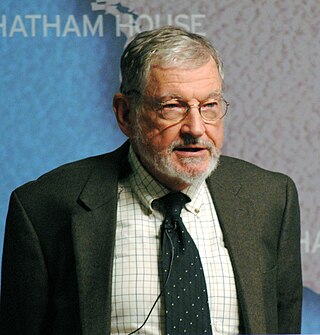Related Research Articles

Argument from ignorance, or appeal to ignorance, is an informal fallacy where something is claimed to be true or false because of a lack of evidence to the contrary.

Counterterrorism, also known as anti-terrorism, relates to the practices, military tactics, techniques, and strategies that governments, law enforcement, businesses, and intelligence agencies use to combat or eliminate terrorism and violent extremism.

Nuclear terrorism is the use of a nuclear weapon as an act of terrorism. There are many possible terror incidents, ranging in feasibility and scope. These include the sabotage of a nuclear facility, the intentional irradiation of citizens, or the detonation of a radiological device, colloquially termed a dirty bomb, but consensus is lacking. According to the 2005 United Nations International Convention for the Suppression of Acts of Nuclear Terrorism nuclear terrorism is an offense committed if a person unlawfully and intentionally "uses in any way radioactive material … with the intent to cause death or serious bodily injury; or with the intent to cause substantial damage to property or to the environment; or with the intent to compel a natural or legal person, an international organization or a State to do or refrain from doing an act."
There is no legal or scientific consensus on the definition of terrorism. Various legal systems and government agencies use different definitions of terrorism, and governments have been reluctant to formulate an agreed-upon legally-binding definition. Difficulties arise from the fact that the term has become politically and emotionally charged. A simple definition proposed to the United Nations Commission on Crime Prevention and Criminal Justice (CCPCJ) by terrorism studies scholar Alex P. Schmid in 1992, based on the already internationally accepted definition of war crimes, as "peacetime equivalents of war crimes", was not accepted.
Christian terrorism, a form of religious terrorism, refers to terrorist acts which are committed by groups or individuals who profess Christian motivations or goals. Christian terrorists justify their violent tactics through their interpretation of the Bible and Christianity, in accordance with their own objectives and worldview.

An insurgency is a violent, armed rebellion by small, lightly armed bands who practice guerrilla warfare against a larger authority. The key descriptive feature of insurgency is its asymmetric nature: small irregular forces face a large, well-equipped, regular military force state adversary. Due to this asymmetry, insurgents avoid large-scale direct battles, opting instead to blend in with the civilian population where they gradually expand territorial control and military forces. Insurgency frequently hinges on control of and collaboration with local populations.
Cyberterrorism is the use of the Internet to conduct violent acts that result in, or threaten, the loss of life or significant bodily harm, in order to achieve political or ideological gains through threat or intimidation. Emerging alongside the development of information technology, cyberterrorism involves acts of deliberate, large-scale disruption of computer networks, especially of personal computers attached to the Internet by means of tools such as computer viruses, computer worms, phishing, malicious software, hardware methods, and programming scripts can all be forms of internet terrorism. Some authors opt for a very narrow definition of cyberterrorism, relating to deployment by known terrorist organizations of disruption attacks against information systems for the primary purpose of creating alarm, panic, or physical disruption. Other authors prefer a broader definition, which includes cybercrime. Participating in a cyberattack affects the terror threat perception, even if it isn't done with a violent approach. By some definitions, it might be difficult to distinguish which instances of online activities are cyberterrorism or cybercrime.
Michael F. Scheuer, is an American former intelligence officer for the Central Intelligence Agency, blogger, author, commentator and former adjunct professor at Georgetown University's Center for Peace and Security Studies. One assignment during his 22-year career was serving as Chief of the Bin Laden Issue Station from 1996 to 1999. He also served as Special Advisor to the Chief of Alec Station from September 2001 to November 2004.

International security is a term which refers to the measures taken by states and international organizations, such as the United Nations, European Union, and others, to ensure mutual survival and safety. These measures include military action and diplomatic agreements such as treaties and conventions. International and national security are invariably linked. International security is national security or state security in the global arena.

Robert Anthony Pape is an American political scientist who studies national and international security affairs, with a focus on air power, political violence, social media propaganda, and terrorism. He is currently a professor of political science at the University of Chicago and founder and director of the Chicago Project on Security and Threats (CPOST).
The ticking time bomb scenario is a thought experiment that has been used in the ethics debate over whether interrogational torture can ever be justified. The scenario can be formulated as follows:
Suppose that a person with knowledge of an imminent terrorist attack that will kill many people is in the hands of the authorities, and he will disclose the information needed to prevent the attack only if he is tortured. Should he be tortured?
Offensive realism is a structural theory in international relations that belongs to the neorealist school of thought and was put forward by the political scholar John Mearsheimer in response to defensive realism. Offensive realism holds that the anarchic nature of the international system is responsible for the promotion of aggressive state behavior in international politics. The theory fundamentally differs from defensive realism by depicting great powers as power-maximizing revisionists privileging buck-passing and self-promotion over balancing strategies in their consistent aim to dominate the international system. The theory brings important alternative contributions for the study and understanding of international relations but remains the subject of criticism.

John E. Mueller is an American political scientist in the field of international relations as well as a scholar of the history of dance. He is recognized for his ideas concerning "the banality of 'ethnic war'" and the theory that major world conflicts are quickly becoming obsolete.

Sociology of terrorism is a field of sociology that seeks to understand terrorism as a social phenomenon. The field defines terrorism, studies why it occurs and evaluates its impacts on society. The sociology of terrorism draws from the fields of political science, history, economics and psychology. The sociology of terrorism differs from critical terrorism studies, emphasizing the social conditions that enable terrorism. It also studies how individuals as well as states respond to such events.
Daveed Gartenstein-Ross is an author and the founder and chief executive officer of Valens Global. In addition to his role at Valens Global, Gartenstein-Ross is a Senior Advisor on Asymmetric Warfare at the Foundation for Defense of Democracies. An internationally-recognized expert on political violence, his work primarily focuses on the development of strategic plans, execution of analytic projects, and instruction at the professional and academic levels. In 2011, Gartenstein-Ross wrote Bin Laden's Legacy: Why We're Still Losing the War on Terror.

Warnings: Finding Cassandras to Stop Catastrophes is a book published by HarperCollins Ecco and written by former United States intelligence and counterterrorism official Richard A. Clarke, and former White House National Security Council Director, and U.S. and UN senior diplomat R. P. Eddy. The book offers a framework, "The Cassandra Coefficient," to help determine which warnings decisions makers should look into more closely, and if some warnings deserve less attention. The case studies range from national security, to threatening technologies, to the global economy, to climate change and speculates on various potential threats to civilization.
Critical terrorism studies (CTS) applies a critical theory approach rooted in counter-hegemonic and politically progressive critical theory to the study of terrorism. With links to the Frankfurt School of critical theory and the Aberystwyth School of critical security studies, CTS seeks to understand terrorism as a social construction, or a label, that is applied to certain violent acts through a range of political, legal and academic processes. It also seeks to understand and critique dominant forms of counter-terrorism.
Islamophobia in the media refers to negative coverage of Islam-related topics, Muslims, or Arabs by media outlets in a way that is hostile, untrue, and/or misleading. Islamophobia is defined as "Intense dislike or fear of Islam, especially as a political force; hostility or prejudice towards Muslims", and the study of how and to what extent the media furthers Islamophobia has been the subject of much academic and political discussion.
Overblown may mean:
Hugh White is an Emeritus Professor of Strategic Studies at the Strategic and Defence Studies Centre of the Australian National University in Canberra, Australia, long-time defence and intelligence analyst, and author who has published works on military strategy and international relations. He was Deputy Secretary for Strategy and Intelligence in the Australian Department of Defence from 1995 until 2000 and was the inaugural Director of the Australian Strategic Policy Institute (ASPI). His 2019 book How to Defend Australia attracted national attention after raising the proposition of re-examining the proposition of an independently nuclear-armed Australia.
References
This article includes a list of references, related reading, or external links, but its sources remain unclear because it lacks inline citations .(March 2009) |
- Mark Sedgwick, Review of Overblown, in Terrorism and Political Violence 19 (2007), pp. 438–40.